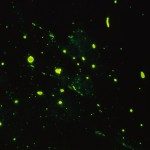Link to Pubmed [PMID] – 40695836
Link to HAL – pasteur-05176661
Link to DOI – 10.1038/s41467-025-62048-7
Nat Commun 2025 Jul; 16(1): 6714
Following infection with SARS-CoV-2, patients may experience with one or more symptoms that appear or persist over time. Neurological symptoms associated with long COVID include anxiety, depression, and memory impairment. However, the exact underlying mechanisms are not yet fully understood. Using golden hamsters as a model, we provide further evidence that SARS-CoV-2 is neuroinvasive and can persistently infect the brain, as viral RNA and replicative virus are detected in the brainstem 80 days after the initial infection. Infected hamsters exhibit a neurodegenerative signature in the brainstem, characterized by overexpression of innate immunity genes, and altered expression of genes involved in the dopaminergic and glutamatergic synapses, in energy metabolism, and in proteostasis. These infected animals exhibit persistent depression-like behavior, impaired short-term memory, and late-onset signs of anxiety. Finally, we provide evidence that viral and immunometabolic mechanisms coexist in the brainstem of SARS-CoV-2-infected hamsters, contributing to the manifestation of neuropsychiatric and cognitive symptoms.












